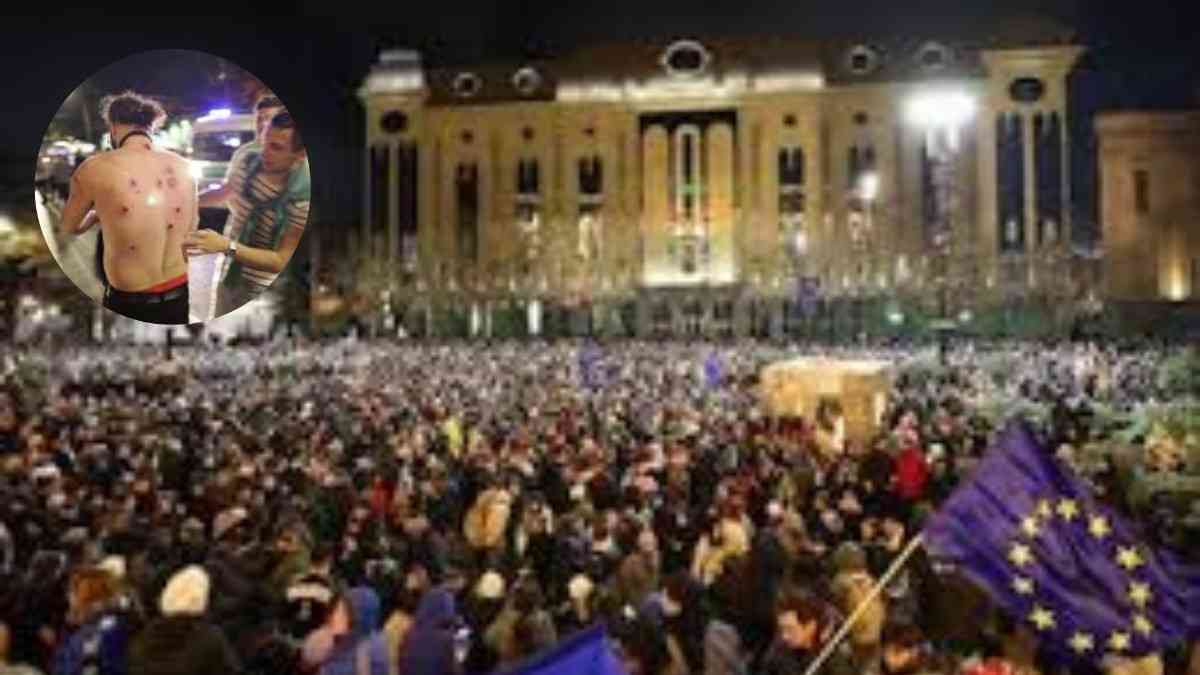On Friday, riot police in Georgia fired tear gas and water cannons against protesters who were demonstrating against the government’s decision to delay its pursuit of membership in the European Union. Thousands of Georgians, waving both EU and Georgian flags, gathered in the capital, Tbilisi, and other cities to voice their discontent.
This follows Prime Minister Irakli Kobakhidze’s declaration that Georgia would not be giving EU accession a priority until 2028, an announcement made amidst a highly politicised post-election crisis.
WATCH THE VIRAL VIDEO:
🇬🇪 Solidarity with the people of Georgia taking to the streets tonight, facing water cannons and tear gas. pic.twitter.com/bHGUOqYe2F
— Melissa Chan (@melissakchan) November 28, 2024
Protests Sparked by Election Discontent
They started due to a deep political crisis in Georgia, plagued bynumerous allegations of election fraud. President Salome Zurabishvili is opposed to the ruling party, Georgian Dream, which has disputed the legitimacy of the newly elected parliament and government. The protests gained momentum following a resolution issued by theEuropean Parliament rejecting the outcome of the October 2023 election, which it described as fraught with significant irregularities and fraud that required new elections under international oversight.
In response, Kobakhidze accused European politicians of “blackmail” and emphasised that Georgia would postpone its EU accession bid until 2028. He claimed that by that time, Georgia would be better prepared to join the EU and could potentially begin talks with Brussels.
WATCH THE VIRAL VIDEO:
In response to recent developments in #Georgia, where the PM announced the suspension of the country’s EU accession process, massive protests continue in Tbilisi. Citizens, students, educators, and workers are coming together tonight to demand their rights, freedoms, and a… pic.twitter.com/eSf7IBni7Y
— European Democrats (@PDE_EDP) November 28, 2024
Violent Crackdown and Media Targeting
The peaceful protests turned violent in the early hours of the morning as riot police clamped down on demonstrators, using tear gas and rubber bullets. Reports from the ground indicated that several protesters and journalists were injured, while barricades were erected and set on fire. Local media outlets have reported that numerous journalists were arrested or targeted during the clashes.
In a statement on social media, President Zurabishvili expressed her support for the Georgian media, which has faced repeated attacks from authorities during the protests. She condemned the government’s actions, calling them an assault on free press and democratic rights.
Prime Minister’s Controversial Decision to Delay EU Talks
Kobakhidze’s decision to delay Georgia’s EU accession has sparked anger across the political spectrum. Opposition lawmakers have boycotted the new parliament, accusing the Georgian Dream party of electoral fraud and undermining Georgia’s democratic institutions. The Prime Minister, however, defended his stance, claiming that the country needed time to address internal reforms before proceeding with EU negotiations.
The European Parliament has taken a firm stance on the matter, with a resolution calling for new elections and the imposition of sanctions on Georgian officials, including Kobakhidze. The resolution reflects growing concerns in Europe over Georgia’s commitment to democratic values and its pivot towards Russia, which many critics see as a move away from European integration.
Georgian Diplomatic Outcry and Constitutional Crisis
In the wake of Kobakhidze’s announcement, around 90 Georgian diplomats issued a joint statement denouncing the delay in pursuing EU membership. They warned that the decision contradicts Georgia’s constitution and could lead to international isolation. The diplomats also expressed their concern that the current government’s actions were further exacerbating the country’s political instability.
Legal experts have also raised concerns about the legitimacy of the new parliament. Constitutional law scholars argue that the parliament’s approval of Kobakhidze as Prime Minister was invalid because it did so before awaiting a court ruling on President Zurabishvili’s challenge to the election results. Vakhtang Khmaladze, one of the authors of Georgia’s constitution, pointed out that a head of government appointed by an illegitimate parliament is equally illegitimate.
The Role of Russia in Georgia’s Political Landscape
The Georgian Dream party, which has faced accusations of moving the country closer to Russia, denies any wrongdoing in the election process. Some analysts argue that the party’s actions, including Kobakhidze’s controversial statements, are indicative of a shift away from European integration and towards Moscow, a move that could further complicate Georgia’s relationship with the West.
Kobakhidze’s remarks about Western interference, particularly regarding the Russia-Ukraine war, have raised concerns in the West. Many fear that Georgia’s ties with Russia could deepen, threatening the country’s aspirations for EU and NATO membership.
Public Sentiment and the EU Membership Debate
Despite the political turmoil, the goal of EU membership remains a key objective for most Georgians. According to recent opinion polls, around 80% of the population supports the country’s EU integration. This widespread public backing highlights the growing divide between the government and its people, with many citizens seeing EU accession as essential for the country’s future prosperity and stability.
Georgia stands at a critical juncture, with its aspirations for European integration hanging in the balance. The ongoing protests and violent crackdowns underscore the deepening political crisis, which threatens to further divide the nation. As the government faces mounting pressure both domestically and internationally, the path forward for Georgia remains uncertain. The country’s future relationship with the EU, and its broader geopolitical alignment, will depend on how the current political standoff is resolved in the coming months.





















